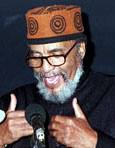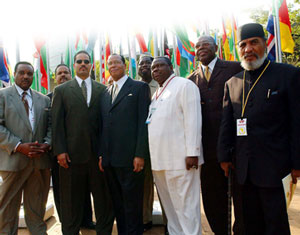
EUTAW, Ala. (FinalCall.com) – The life of Rev. James Bevel was remembered Dec. 29, at a tribute that became a history lesson spanning five decades. It was a lesson in how a man understood at an early age that he should try to change the world and with a non-violent doctrine he could. It was an oral history lesson spoken by many of the leading men and women of the time.
“Bevel was totally committed to the nonviolence of Mahatma Gandhi. When he was a student at Fisk University he went to the library and instead of checking out one book, he checked out all of the books on Mahatma Gandhi,” former Ambassador Andrew Young told The Final Call.
“When they asked him where are you going with all those books he said, ‘I’m going to read them and put them into practice,’ and he did. He was committed to changing the world without destroying people or property. Most of all he was committed to changing the world.”
The year was 1959. A group of students–Marion Barry, John Lewis, James Bevel, Bernard Lafayette, Diane Nash and C.T. Vivian–studying civil disobedience in Nashville, Tenn., begin planning a sit-in demonstration at downtown lunch counters.

“I first met him when I was 17-years-old,” said Rep. John Lewis (D-Ga.). “He was a smart, gifted, extraordinary man. He was God’s gift to many of us. He was one of the founding fathers of a new America.
“If it hadn’t been for James Bevel I wouldn’t be in the Congress. This man gave us the freedom to not just liberate a people but to liberate a nation.”
From the successful sit-ins, to the 1961 Freedom Rides, to the Mississippi Voting Rights Movement to the work with the Student Nonviolent Coordinating Committee to meeting Dr. Martin Luther King and becoming the Southern Christian Leadership Conference’s director of Direct Action and director of Nonviolent Education, Rev. Bevel started making an impact on American society.
Next came the Birmingham Children’s Crusade in 1963. Rev. Bevel organized children to march to city hall. The police dispersed them with fire hoses. The horrific incident received massive media coverage and provoked international outrage.
Rev. Bevel kept going. He wanted to organize a children’s march to Washington from Birmingham to question President Kennedy on segregation.
“A March on Washington, James Bevel started it and it was my job to stop it. My job was always to put brakes on his ideas. He had great ideas. He always meant it when he said, ‘We want our freedom and we want it now,’” said Ambassador Young, another King disciple and civil rights stalwart. “The March on Washington created a movement. He was a man of all seasons, a man of faith.”
The death of Jimmy Lee Jackson
It was 1965 and Jimmy Lee Jackson was defending his mother from an attack by Alabama state troopers. The Jacksons were demonstrating the arrest of student activist James Orange and troopers beat them in a small restaurant, where they were hiding after police and troopers assaulted protestors.
Jimmy Lee was shot in the stomach and died days later.
“His death started the Selma to Montgomery March,” explained Johnny Flowers to The Final Call. “I was only 16-years-old then and when James Bevel heard about it he came to organize the march. He wanted to carry the body to the capital and dump it on Gov. George Wallace. I was in Selma marching but got turned around on Bloody Sunday.”
The marchers were bludgeoned and tear gassed on the Edward Pettus Bridge. It was a painful event but the movement didn’t stop. The news and pictures of what happened on Bloody Sunday, March 7, 1965, attracted massive media attention. Two days later, Dr. King led a symbolic march to the bridge, which was followed by a March 21 march by thousands, including religious figures and celebrities, who walked 54 miles to Montgomery. Dr. King delivered his “How Long, Not Long” outside the State Capitol Building and a few months later President Lyndon Johnson signed the Voting Rights Act of 1965.
In 1965 SCLC gave its highest award, the Rosa Parks Award to James Bevel and his wife Diane Nash.
The list of historical accomplishments from then on is chapter and verse of sacrifice and dedication. He went to Chicago and directed the Open Housing Movement, opposed the Vietnam war and he witnessed the assassination of Dr. Martin Luther King.
Fast forward to the 90s. Rev. Bevel continued to fight for freedom. In 1992, he ran as a vice presidential candidate with Lyndon LaRouche running for president.
“Bevel was completely fearless in the pursuit of truth,” Dennis Speed, who worked on the campaign, told The Final Call. It didn’t mean he knew what the truth was but that fierce pursuit of truth was his religious vocation.”
It was also in the 1990s that Jauhar Abraham, head of D.C.’s Peaceoholics, a group that promotes ending urban violence, met Rev. Bevel.
“I ran into him at Howard University and I had never heard any preacher or pastor talk like this. I really heard him preach as we were organizing for the Million Man March,” said Mr. Abraham.
Rev. Bevel gave the idea of a Holy Day of Atonement to the Honorable Minister Louis Farrakhan to use for the Million Man March.
“He would give me one lesson after another. He gave me things I couldn’t get anywhere else. He taught me to learn to forgive and not to judge. It was his teaching that allowed someone I perceived as my enemy to come together with me. It was because of him that 15,000 families have benefited from this work,” said Mr. Abraham.
Rev. Bevel’s life was full of triumphs but it was not without its trials. He died Dec. 19, of cancer, waiting on an appeal of his conviction of child abuse.
“None of us are without sin. None of us could stand under the weight of Jesus’ admonition,” said Min. Farrakhan. “The last time I saw him he was in prison. We talked through a glass. He was going to share something with us to make the world better. I don’t know anything about James Bevel’s personal life. That’s none of my business.”
“I thank God for his life. I’m glad to be with the people of the movements started by the sacrifice of so many,” said the Minister. “When God is pleased with the labor of His servants, he throws their sins into the sea of forgetfulness.”












